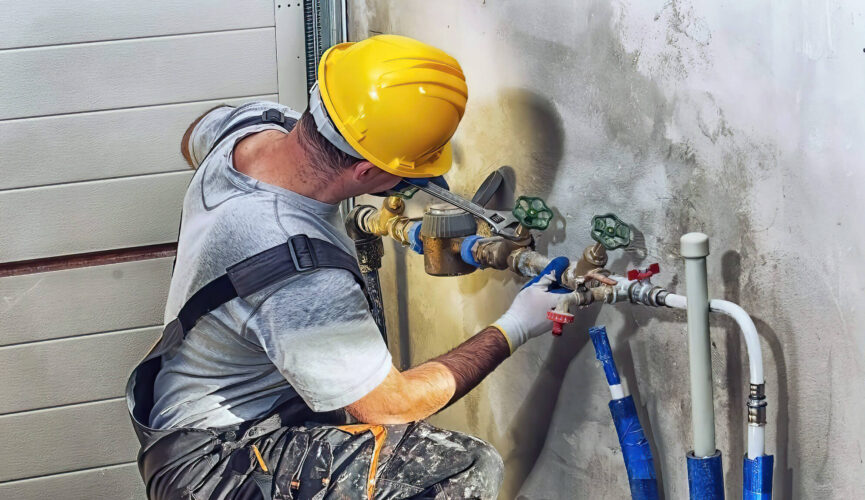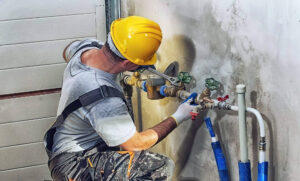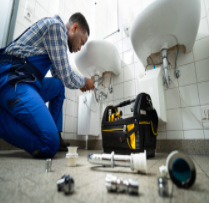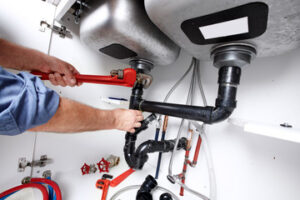Imagine waking up in the middle of the night to the sound of gushing water. A professional plumber on speed dial can prevent extensive damage and keep you and your family safe.
Plumbing is a complex and vital trade that requires education, training, and certification. Contact Plumber Sarasota for professional help.
Plumbers are responsible for the pipes that carry water, sewage and other essential substances throughout your home. They also help to repair and maintain these systems. As such, it’s crucial that you choose a qualified and experienced professional to ensure that your plumbing works well and safely.
To become a skilled plumber, years of training and experience are needed. In addition, you must be licensed to perform plumbing work in your jurisdiction. You should always look for certified professionals, as they adhere to a code of ethics and quality standards set by their trade association.
During plumbing installations, stringent safety procedures help protect homeowners from problems such as water backups, foul odors and hazardous gases. In addition, using high-quality materials and following industry practices can enhance the longevity of your plumbing system. Open communication with customers, regular equipment inspections and safety talks are critical for ensuring that your team prioritizes safety protocols and creates a safe working environment.
Working at heights and climbing ladders pose some of the most significant safety risks for plumbers, and these can lead to falls or other injuries. Other hazards include exposure to toxic chemicals, electrical work in confined spaces and working with small tools in tight places. Plumbers can mitigate these risks by ensuring that they have the right equipment and training for their specific job, performing risk assessments before starting a project and adhering to strict safety regulations.
Choosing products that are easy to install and require minimal manual labour could further minimise the physical strain of plumbing tasks. This can significantly reduce the time spent on each task and potentially lower the likelihood of repetitive strain injury. Regular stretching and exercise can also improve a plumber’s overall health and wellbeing. It is also important to use appropriate protective equipment, such as rubber gloves and eye protection, when handling hazardous materials or working in elevated or confined spaces. Lastly, implementing an integrated software platform can make it easier for you to track each plumber’s performance and habits, and identify any underlying safety concerns.
Expertise
Plumbing is a complex trade that requires specialized knowledge and training. Many plumbers pursue continuing education and certification opportunities to stay on top of new technologies related to their craft. This helps them perform repairs more efficiently and accurately. They also save their clients money by diagnosing problems and fixing them correctly the first time. In contrast, a DIY repair may not only cost more in materials but can lead to additional problems that require expensive fixes down the road.
The qualifications that plumbers need to succeed vary by region but include a high school diploma and some form of post-secondary education or on-the-job training. Some states and municipalities even require a license to work as a plumber, which generally involves passing an exam and gaining two to five years of experience in the field. Other professional certifications, such as National Inspection Testing and Certification (NITC) or the International Association of Plumbing and Mechanical Officials (ASSE) certifications, can also enhance a plumber’s career prospects.
Licensed plumbers have experience in a variety of situations, from installing new pipe systems for residential renovations to repairing existing commercial plumbing equipment. Their duties include interpreting blueprints and building codes, inspecting pipes for leaks or blockages, fitting replacement parts such as valves and taps, and power flushing central heating systems. They are also familiar with water conservation and best practices for maintaining plumbing systems.
Plumbers who specialize in commercial and industrial plumbing work often collaborate with architects and construction teams to ensure that a building’s plumbing is integrated seamlessly into its overall infrastructure. They may also help install water treatment systems and fire sprinklers.
A plumber’s career can be rewarding and exciting, providing a good salary and the opportunity to help people in need. It can also be a physically demanding job that requires physical stamina and dexterity. Plumbers should have a strong interest in the work they do and enjoy helping their clients. They must be able to communicate effectively and follow detailed instructions to ensure the quality of their work. They should also be comfortable working in tight spaces and using heavy tools.
Minor Repairs and Checkups
Plumbers perform a wide range of tasks, including installing new piping and fixtures, repairing existing ones, and diagnosing problems. They can unclog drains, fix leaky faucets, install garbage disposals, and even handle more complex jobs like replacing pipes or rerouting water flow to prevent flooding. They have the tools and knowledge to quickly identify and address issues, saving homeowners time and money.
Local plumbers are familiar with the building codes and regulations in their area, which means that they can complete repairs and installations safely and legally. They also have access to specialized tools and equipment that may be needed for more difficult or serious problems. For example, they can use cameras to inspect sewer lines without digging holes in the walls or floors.
Regular checkups can also help you save on plumbing costs in the long run. For instance, a small leak in a pipe might seem harmless, but it can lead to hundreds of wasted gallons of water per month. A plumber can inspect your entire system and find and fix any minor issues before they become bigger problems. Additionally, they can recommend water- or waste-monitoring sensors to help you keep track of your consumption and spending.
Emergency Repairs
When you are facing a plumbing emergency, it is important to act quickly. This will prevent further damage and save you money in the long run. Emergency plumbers are available round the clock and have the skills and equipment needed to resolve your issue quickly. They can also provide advice on how to prevent future plumbing emergencies from occurring.
One of the biggest benefits of using a plumber is their experience. Plumbing is a complex job that requires training and knowledge of safety procedures. Trying to fix plumbing issues without the proper experience can lead to more expensive repairs in the future. A professional plumber will be able to diagnose the problem and find a solution that will last.
Plumbing problems can arise at any time and can be extremely disruptive to your home. From leaky faucets to clogged toilets, these problems can cause a lot of damage in a short amount of time. Choosing the right plumber can make all the difference in ensuring that your plumbing issue is resolved quickly and effectively.
Plumbers are trained to work with a variety of different materials, including metal, plastic, and fiberglass. They can install water heaters, fix leaking pipes, and repair or replace sewer lines. In addition, they can help you choose the right appliances for your home and install them properly. This ensures that your new plumbing system will function as intended and reduces the risk of future issues.
Another benefit of using a plumber is their insurance. This protects you in case the plumber accidentally damages other parts of your home while working on your plumbing. It also covers any lost items in the event that the plumber must remove them to get to the problem.
Plumbing emergencies can occur at any time, and they are often difficult to deal with. From clogged toilets to burst water heaters, these issues can be very stressful and costly. However, there are steps that you can take to minimize the damage and prevent these problems from happening again in the future. These include hiring a licensed emergency plumber, documenting the damage, and maintaining accurate records of all expenses.






 High-Quality Materials
High-Quality Materials
